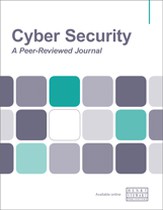European cyber security law in 2023: A review of the advances in the Network and Information Security 2 Directive 2022/2555
Abstract
Cyber security capabilities must be designed to mitigate attacks and threats to key network and information systems and ensure continuity in service provision, contribute to the security and effective functioning of economies and societies, and the Network and Information Security 2 Directive (NIS2) seeks to strengthen the European Union (EU) approach to this. Advances in artificial intelligence (AI) have revolutionised industries including banking (FinTech), law (RegTech), insurance (InsureTech), charities (CharityTech) and health (HealthTech). The EU understands this and has therefore introduced the requirement for member states to embrace AI, as a cyber security tool used to protect against and prevent cyber security attacks/threats. The purpose of this paper is to review the NIS2 and the changes it makes to the European approach to cyber security including the use of AI, and the implications for businesses subject to the new rules. The subject is explored through an analysis of literature, EU law and policy documentation. This paper critically reviews a significant advent in European cyber security and technology law: the advances created by the NIS2 Directive, which are considered alongside other key legislation that came into force in January 2023. In addition, the UK’s contrasting evolving position is also critically reviewed. The paper concludes with several practical suggestions on the, if any, steps for businesses as at April 2023. The NIS2 makes some significant inroads to close security gaps that existed in the EU cyber security-related legislative framework; importantly, it creates a requirement for the use of AI in the EU’s cyber security defence armoury. Businesses need to undertake several steps in preparation for full implementation of the NIS2. This research is among the first to review key advances made in EU cyber security and technology law, and to contrast that with the UK position as at April 2023. It is also the first to discuss the likely powers of competent authorities, and the potential results of breaching other EU legislation such as the General Data Protection Regulation (GDPR).
The full article is available to subscribers to the journal.
Author's Biography
Charanjit Singh PhD, is a Tenant and Barrister-at-Law at Holborn Chambers, and Assistant Head of School at the University of Westminster in London, UK. He has a PhD from the University of Southampton and writes extensively on corporate law, RegTech, artificial intelligence (AI) and evidence law. He has practised in professional and academic law for many years, with the aim of deconstructing the law for practitioners and academicians. His research explores the resultant effects of AI and the frameworks required to adequately regulate it.
